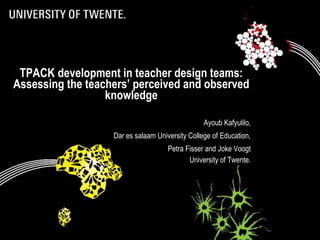
TPACK development in teacher design teams: assessing the perceived and observed teachers' knowledge
- 1. TPACK development in teacher design teams: Assessing the teachers’ perceived and observed knowledge Ayoub Kafyulilo, Dar es salaam University College of Education, Petra Fisser and Joke Voogt University of Twente.
- 2. Introduction This study was conducted with the in-service science teachers in Tanzania. It adopted design teams as professional development arrangement to develop teachers’ technology integration knowledge and skills. TPACK was used as a framework for describing the teachers’ knowledge requirements for integrating technology in science teaching
- 3. The Intervention The study comprised of four intervention activities The workshop Lesson design in design teams Lesson implementation in the classroom Mostly a projector and a laptop were used in teaching Reflection with peers (peer appraisal)
- 4. Lesson design in design teams
- 5. An example of a classroom set up with a projector, laptop and a projection screen
- 6. Research questions What is the in-service science teachers’ perceived TPACK before and after intervention? What are the observed in-service science teachers’ TPACK before and after intervention?
- 7. Participants The study adopted a case study design Design teams were study cases Individual teachers were the units of analysis. 12 in-service science teachers participated in the study. The 12 teachers formed three design teams (each with 4 teachers)
- 8. Instrument Six data collection instrument were used in this study to collect self-reported and observed data. Self reported data were collected through; TPACK survey, Reflection survey, Focus group discussion and Interview Observation data were collected through; Classroom observation checklist, Researcher’s logbook
- 9. TPACK Survey (pre and post-intervention) The TPACK survey was used before and after the intervention The instrument was adopted from Schmidt et al (2009) and Graham et al (2009) and used a 5 point Likert scale The reliability was 0.93 Cronbach’s alpha
- 10. Observation checklist The observation checklist was administered before and during the intervention The items had a 3 point Likert scale: “No” = absence, “No/Yes” = partial existence, and “Yes” = presence of the behavior Two people rated the observation checklist and the inter-rater reliability was 0.87 Cohen Kappa.
- 11. The reflection survey The reflection survey was administered at the end of the intervention to assess the teachers’ opinions about learning technology in design teams The overall reliability for items related to TPACK was 0.68 Cronbach’s alpha.
- 12. Researcher’s logbook The researchers’ logbook was used to maintain a record of activities and events occurring during the intervention process. The researcher’s logbook was used during peer appraisal, TPACK training and lesson design. Data collected through the researchers logbook were important in describing the interventions processes.
- 13. Teachers’ interview The interview was administered at the end of the intervention to asses the effectiveness of design teams in teachers’ development of TPACK An example of the interview question was: What technology integration knowledge and skills did you develop from design teams? Four randomly selected interviews out of12 interviewees were coded by a second person. The inter-coder reliability was 0.83 Cohen Kappa.
- 14. Focus group discussion A focus group discussion was administered at the end of the intervention An example of the question asked in FGD was: How do you evaluate the results of your discussion in design teams; in terms of the products you made, decisions in the team, new ideas and innovations Two randomly selected FGD were coded by a second person. The inter-coder reliability was 0.92 Cohen Kappa.
- 15. Results: Teachers’ perceived TPACK before and after the intervention Before intervention, teachers perceived their CK, PK and PCK as high, and TK, TCK, TPK and TPCK were low. After intervention, all TPACK components were perceived high. A Wilcoxon signed ranks test for two related samples showed that TK, PK, TCK, TPK and TPACK were significant at p ≤ 0.01 whereas CK and PCK were significant at p ≤ 0.05 Results from the reflection survey showed that teachers’ developed TPACK through their participation in design teams.
- 16. Results (Teachers’ observed TPACK) Findings from teachers observation showed a significant difference between pre- and post- intervention results. Pre-intervention results showed a low teachers’ TK, TCK, TPK, and TPACK (M < 1.5, SD ≤ 0.17) in a three points Likert scale However, in the post-intervention results, all TPACK components were high (P ≤ 0.05).
- 17. Conclusions The triangulation of the findings from self-reported and observed data showed; A limited teachers’ TK, TPK, TCK and TPACK before intervention, After intervention all the TPACK components were high In this study, self-reported data comply with the observed data This differs from the findings of Alayyar (2011) and Kafyulilo et al (2011) which showed a difference between the observed and perceived TPACK
- 18. Conclusions Probably this has something to do with The instrument, The culture and The level of the teachers. Findings from both observed and self-reported data indicate that teachers’ PK, CK and PCK were high before and after intervention. This may suggest that in the context of Tanzania, technology integration efforts need to focus more on technology related components of TPACK rather than the whole TPACK.
- 19. Thanks for your attention kafyulilo@duce.ac.tz
